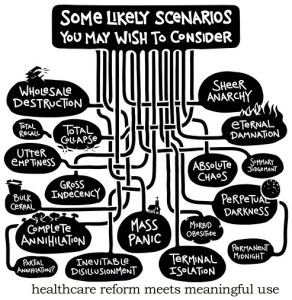
This past weekend I spent some time with a nurse who works in a primary care/pediatrics clinic in Vermont. There facility, part of a network of several clinics, recently adopted and went live with a new EHR system (about 18 months ago). According to the nurse, this EHR, from one of the big names in ambulatory systems, has been a complete disaster for the clinic. Productivity is way down, countless glitches have occurred, whole system crashed during a recent upgrade and the list goes on. For 2009, this clinic, which has been in operation for a few decades, had its first ever loss last year, the year they went live with this EHR. The clinic puts the blame squarely on the EHR, which has severely constricted their ability to see patients and as all readers know, clinicians get paid for seeing patients, not trying to use a complex and difficult to use EHR.
It is stories like this that concern me.
This is a clinic trying to do the right thing, trying to use an EHR in a meaningful way (note, did not say meaningful use) and they are struggling. Yes, they do want to deliver the best patient care, but at the end of the day, they, like any business have bills to pay. They are losing money far in excess of what HITECH Act incentives will provide. This story is, unfortunately, not unique, though few EHR vendors will come clean on the productivity hit to a practice. Maybe instead of guaranteeing that their application(s) will meet MU criteria, EHR vendors should guarantee that the productivity hit of using their solution will not exceed HITECH incentive payments. Now that would be an interesting value proposition.
Thanks to Michael Jahn of Jahn & Associates for the MU cartoon.
Addendum:
This post was picked up by The Health Care Blog (THCB) and there is quite a lively discussion occurring in the comments area.




I’m sure there are many people who be interested in “what went wrong” with this implementation so others can learn from the mistakes. Any chance of providing a list of the major causes of issues (i.e., was inadequate business process analysis a part of the problem?)?
Yes Beth, there are some lessons to be learned here and I am in the process of delving deeper into the implementation and roll-out of this particular EHR to get to the bottom of this deployment. What I do know…
1) The user interface is a nightmare for clinicians – little attention paid to workflow, far too many clicks to accomplish event the simplest of tasks.
2) Recent upgrade caused a system wide failure and an inability for this particular clinic to access notes which made for some very awkward visits with patients when clinicians could not recall by memory what happened at last visit. The work-around was eventually having the larger host clinic of software print out the notes, fax them to this smaller clinic where clinicians (ie nurses) re-entered the data.
3) This small clinic (3 docs, 5 nurses, 2 admin) may have been better off with a simpler EHR more appropriate to the size of clinic than the one instaled, who’s sweet spot is in the 50 docs and more practices.
I don’t think that small physician practices are the best settings for implementation of an EHR. The financial incentives do not outweigh the cost to transition from a paper-based system. However, I do think that other applications such as E-Prescribing are of great benefit to a small practice setting. In the final analysis, it is all going to become electronic, maybe dominated by a few large IT company products.
From a ‘Green Mountain’ boy – Gerry Higgins